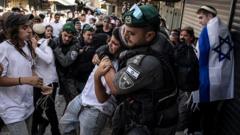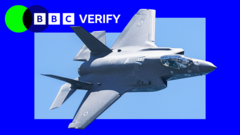As Jerusalem commemorated its reunification after the 1967 war, far-right marches turned violent against Palestinians, sparking widespread criticism from opposition leaders. This event reflects the ongoing strife in the region, with implications for both community relations and international perspectives.
Violence Erupts During Far-Right Jerusalem Day March Amid Ongoing Conflict

Violence Erupts During Far-Right Jerusalem Day March Amid Ongoing Conflict
Far-right Israelis clashed with Palestinians during an annual Jerusalem Day parade, drawing condemnation from political leaders and escalating tensions in a city marked by deepening divisions.
In Jerusalem's Old City, far-right Israelis engaged in alarming violence against Palestinians on Jerusalem Day, celebrating Israel's capture of the city during the 1967 Arab-Israeli war. Chants including violent slogans such as "death to Arabs" marked the march, while many Palestinian residents were verbally and physically assaulted by ultranationalists.
Opposition figures criticized the event, with leader Yair Lapid condemning it as a display of "hatred and racism" that tarnishes the values of Judaism. Clashes ensued shortly after noon as right-wing marchers descended upon significant Palestinian areas like the Damascus Gate. Activists held provocative banners stating "67 - Jerusalem in our hands; 2025 - Gaza in our hands," underlining their nationalistic sentiments that incite further tension.
Israeli police intervened as some marchers became overly aggressive, detaining individuals for harassment and violence. National Security Minister Itamar Ben Gvir, during his speech, called for the harshest penalties against perceived "terrorists," intensifying fears regarding official support for such confrontational actions. His visit to the Al-Aqsa mosque, a highly sensitive site, further amplified anger among Palestinian leaders who accused Israel of destabilizing the region through aggressive actions and provocations.
Israel's ongoing military operations in Gaza, which escalated following the Hamas attacks in October, backdrop this year's Jerusalem Day events. As casualties mount and tensions flare, both the Israeli government and Palestinian authorities face pressure to address the critical dynamics at play. Nabil Abu Rudeineh, a spokesperson for the Palestinian presidency, expressed concern over potential disruptions to regional stability stemming from these violent consequences, identifying the actions taken during the march as further provocation.
Amidst graphic scenes of violence, leaders from the Israeli Left articulated a pressing call for unity, emphasizing the need for Jerusalem to remain a shared city for people of all faiths. The celebrations, which typically culminate at the Western Wall, serve as a reminder of the deep-rooted divisions that persist amidst ongoing conflicts and differing claims to the city by both Israelis and Palestinians.
Opposition figures criticized the event, with leader Yair Lapid condemning it as a display of "hatred and racism" that tarnishes the values of Judaism. Clashes ensued shortly after noon as right-wing marchers descended upon significant Palestinian areas like the Damascus Gate. Activists held provocative banners stating "67 - Jerusalem in our hands; 2025 - Gaza in our hands," underlining their nationalistic sentiments that incite further tension.
Israeli police intervened as some marchers became overly aggressive, detaining individuals for harassment and violence. National Security Minister Itamar Ben Gvir, during his speech, called for the harshest penalties against perceived "terrorists," intensifying fears regarding official support for such confrontational actions. His visit to the Al-Aqsa mosque, a highly sensitive site, further amplified anger among Palestinian leaders who accused Israel of destabilizing the region through aggressive actions and provocations.
Israel's ongoing military operations in Gaza, which escalated following the Hamas attacks in October, backdrop this year's Jerusalem Day events. As casualties mount and tensions flare, both the Israeli government and Palestinian authorities face pressure to address the critical dynamics at play. Nabil Abu Rudeineh, a spokesperson for the Palestinian presidency, expressed concern over potential disruptions to regional stability stemming from these violent consequences, identifying the actions taken during the march as further provocation.
Amidst graphic scenes of violence, leaders from the Israeli Left articulated a pressing call for unity, emphasizing the need for Jerusalem to remain a shared city for people of all faiths. The celebrations, which typically culminate at the Western Wall, serve as a reminder of the deep-rooted divisions that persist amidst ongoing conflicts and differing claims to the city by both Israelis and Palestinians.

















